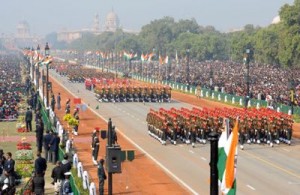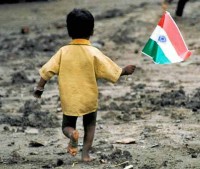
On 26th January 1950, India became a Republic with a revised Constitution and a confident claim to Democracy. Declared as a national holiday, it became an occasion to celebrate and showcase much of India’s diversity through parades and other ceremonies which took place all across India, presided over by top Government dignitaries. Colourful floats carry dancers, musicians, craftsmen, artists from all corners of the country; the Armed Forces come out in all their regalia, shining with pride and marching to impress one and all; jets fly high, dazzling everyone with their acrobatic display. Once Television started broadcasting it from New Delhi, it became a standard practice to sit with the whole family and spend one’s morning watching the spectacle. Nothing has changed. The commentary, the show being put on, even the speeches. And it is the last of these that I feel most struck by. The President of India has to address the Nation and in this moment of truth, tells us all that is going wrong or right or the direction that one must take in the future. Some of the earliest speeches would certainly have struck one as “inspirational”, for after all, we had just come out of the clutches of the British and needed motivation to move forward. However, very tragically, barring a few obligatory touch-ups, the speeches remained quite the same over time, unchanged in content and objective.
Sample this:
Dr. Rajendra Prasad (Term of Office: 26 January 1950 to 13 May 1962)
“Today, for the first time in our long and chequered history, we find the whole of this vast land… brought together under the jurisdiction of one constitution and one union which takes over responsibility for the welfare of more than 320 million men and women who inhabit it.”
“We must remember that this is more a day of dedications than of rejoicing – dedication to the glorious task of making the peasants and workers, the toilers and the thinkers fully free, happy and cultured.”
Dr. Shankar Dayal Sharma (Term of Office: 25 July 1992 to 25 July 1997)
“… And yet who can deny the range of problems and deficiencies which cry for solution? Abject poverty, hunger, disease and ignorance torment many and raise questions as to the validity and efficaciousness of our policies and programmes.
Crimes against weaker sections and women, acts of violence and intimidation, challenge our claims of building an egalitarian society. The fruits of progress to a substantial extent are negated by our burgeoning population and the complexities innate to the task of equitable distribution in a country of India’s diversities and dimensions.
… I feel convinced that India’s need today is for a profound moral and ethical rejuvenation, the building of a nationwide commitment to our national values and goals and the integration and unification of the people…”
K. R. Narayanan (Term of Office: 25 July 1997 to 25 July 2002)
“Fifty years into our life in the Republic we find that Justice – social, economic and political – remains an unrealized dream for millions of our fellow citizens. The benefits of our economic growth are yet to reach them. We have one of the world’s largest reservoirs of technical personnel, but also the world’s largest number of illiterates; the world’s largest middle class, but also the largest number of people below the poverty line, and the largest number of children suffering from malnutrition. Our giant factories rise from out of squalor; our satellites shoot up from the midst of the hovels of the poor.
Not surprisingly, there is sullen resentment among the masses against their condition erupting often in violent forms in several parts of the country. Tragically, the growth in our economy has not been uniform.”
“To open a newspaper or to hear the news over television now requires nerves of steel. Violence in society has bared a hundred fangs as the advertisement-driven consumerism is unleashing frustrations and tensions in our society. The unabashed, vulgar indulgence in conspicuous consumption by the nouveau-riche has left the underclass seething in frustration. One half of our society guzzles aerated beverages while the other has to make do with palmfuls of muddied water. Our three-way fast lane of liberalization, privatization and globalization must provide safe pedestrian crossings for the unempowered India also so that it too can move towards ‘Equality of Status and Opportunity’ …”
Pratibha Devisingh Patil (Term of Office: 2007 to 2012)
“… The time has come for us to take a closer look at our social milieu. Is there growing criminalization of our society? Is there increasing apathy towards each other? Are we becoming too materialistic, shortsighted and unconcerned about the impact of our actions on our brethren, society or the environment?”
“Programmes for women, the youth, the girl child, the differently-abled and marginalized sections of society will equip them to avail of opportunities and face the future with confidence. We need to address the problems of orphans and street children, as well as of the old and destitute.”“In any arrangement, it should be kept in mind that farmers are stakeholders in every aspect related to agriculture, whether it is cultivation related activities, warehousing, processing, marketing, research or development. Farmers, therefore, must be involved in all these various activities, with a sensitivity that safeguards their rights on their land and its produce.”
This could mean two things: A) our speech writers are rather lacking in imagination and continue to dole out poor re-runs or B) our country is not making the necessary progress in the themes outlined each year.
Personally, I think it is a bit of both, much more of the latter of course, but also a general trend in this country to not exercise ‘originality’. While that too is a troublesome matter in its own right, the question of whether India has failed to fulfill her annual promises, year after year, is a huge concern and requires no introspection whatsoever as it is clear for all to see – our priorities as a collective are totally and utterly wrong. There is so much emphasis laid by our Presidents on “farmers and agriculture”, “women empowerment”, “women safety”, “education”, “malnourishment” and yet horrifically, one finds that these are the exact areas where we have not budged an inch and in fact, slid further. Farmers are committing more suicides than they were when the first speech took place; women are raped, beaten, tortured, killed, enslaved in alarming numbers; children across India are still dying because of lack of food and adequate health care and of course President Kalam’s proclamation that by 2020 every citizen of India will be educated seems like a poor joke.
One may say we have progressed in Economy but what does that really mean? A better economy isn’t when your pockets are fuller than they were before. A better economy is when that collective capital is invested in boosting, polishing, revamping, restructuring, improving, perfecting these very areas that today are crumbling before our eyes. Then one sees a marked improvement in all spheres. Dying farmers are not an indication of a better economy no matter which angle you look from but if these farmers find the country backing them through rain or shine, they will put in their sweat all the more to make sure that our soil remain forever tilled. If that extra wealth remains with a few and refuses to percolate down to the hundreds still steeped in “abject poverty”, then it is not economic growth of the nation we are speaking of – it is mere extra pocket money for those few, that is all. And pocket money is only an excuse to splurge on something we like or want. It is not something we invest in a child’s health plan or a woman’s vocational training.
I am not an expert in Political Science or Governance or Economics or Social Structures. But I am one of those who has seen these parades taking place against the magnificent backdrop of the Rashtrapati Bhavan. I am one of those who as a child was awestruck by the diversity and colour and traditions and grandeur with which the ceremonies took place. And I am one of those who now never switches on the television to see this grand annual spectacle not only because it seems so lacking in something “fresh” or “original” but more so because it strikes me as a lie. It is an untruth that is boldly paraded for millions of spectators to see and swallow.
 If India is to become proud of her status as a Republic or a Democracy or a Growing Nation, then she first has to get her priorities back in place. She needs to start Doing instead of simply Talking. Our progress needs to start from the ground where all the dirt is because the top is already blooming. I don’t need the Government of India to give me more pocket money. I just want a country I can feel proud of belonging to.
If India is to become proud of her status as a Republic or a Democracy or a Growing Nation, then she first has to get her priorities back in place. She needs to start Doing instead of simply Talking. Our progress needs to start from the ground where all the dirt is because the top is already blooming. I don’t need the Government of India to give me more pocket money. I just want a country I can feel proud of belonging to.
(Thank you www.sankalpindia.net for the image of a child carrying the Indian flag)





